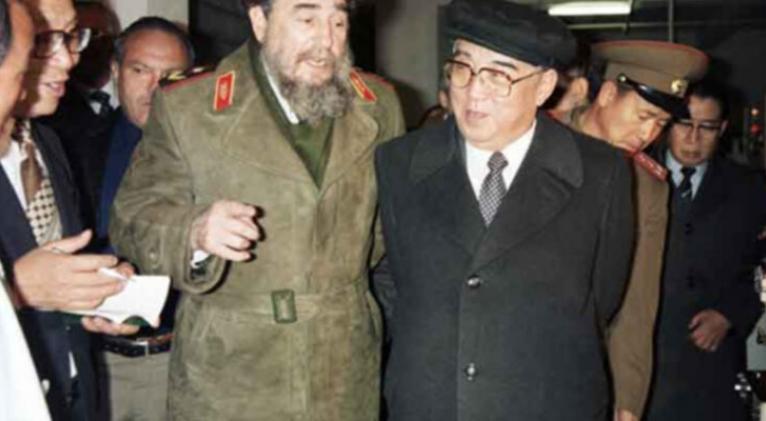Cuba and the Democratic People’s Republic of Korea, 65 Years of Friendship
especiales

The Republic of Cuba and the Democratic People’s Republic of Korea (DPRK) mark on August 29 the 65th anniversary of the establishment of diplomatic relations in 1960, built on friendship among peoples, parties and governments.
This was highlighted by the Commander in Chief of the Cuban Revolution, Fidel Castro Ruz, on March 11, 1986, during his visit to the DPRK, where he held friendly talks with its leader, Kim Il Sung.
On that occasion Fidel said: "We have been able to glimpse the Korea of liberated workers, of a sovereign and dignified people, of creative scientists, of happy children, the Korea of socialism."
He praised the Korean people for their "tenacity and firmness, which under the leadership of comrade Kim Il Sung transformed the heroism of war into the no less important heroism of selfless, disciplined daily labor, from which a developed industry, an impressive construction effort and a modern and efficient agriculture emerged."
Mutual cooperation, shared positions on international issues, the DPRK’s consistent support for Cuba and its condemnation of the U.S. blockade that has lasted for more than six decades are part of a legacy of dignity and value between the two nations.
At the 73rd Session of the United Nations General Assembly on September 26, 2018, Cuban President Miguel Díaz-Canel Bermúdez strongly condemned "the imposition of unilateral and unjust sanctions against the Democratic People’s Republic of Korea and external interference in Korean affairs."
In November 2018, Díaz-Canel was welcomed in Pyongyang by DPRK leader Kim Jong-un and a massive crowd of more than one million people along the route traveled by both dignitaries.
This closeness has been consistently evident, both in international forums and in the numerous official visits by Cuban leaders to that Asian nation, beginning with Commander Ernesto Che Guevara, who was given a warm public reception on December 3, 1960.
In 1966, then-President Osvaldo Dorticós and the current Army General Raúl Castro Ruz visited Pyongyang, carrying a message of greeting and admiration for the Korean people and their leadership, and received a heartfelt welcome from their hosts.
In a Reflection dated July 24, 2008, Fidel Castro wrote: "When I arrived in the Democratic People’s Republic of Korea, almost 33 years after the destruction left by the war, it was difficult to believe what had happened there.
"That heroic people had built countless works: large and small dams and canals to store water, produce electricity, supply cities and irrigate fields, as well as thermal power plants, major mechanical industries and others, many of them underground, carved into the depths of rock through hard and methodical labor.
"Due to the lack of copper and aluminum they were even forced to use iron in transmission lines that devoured electrical energy, partly generated from coal.
"The capital and other devastated cities were rebuilt block by block. I estimated millions of new homes in both urban and rural areas and tens of thousands of service facilities of every kind. Endless hours of labor had been transformed into stone, cement, steel, wood, synthetic products and equipment.
"The crops I observed everywhere I went looked like gardens. A well-dressed, organized and enthusiastic people were everywhere welcoming visitors. They deserved cooperation and peace."
The history of the DPRK in its struggle for independence is long, heroic and rich. In 1905 Japan invaded Korea and in 1910 forcibly annexed its territory, ending the Yi dynasty.
Japan used Korea as a supplier of food and a source of cheap labor. This allowed the northern region to develop industrially during those years to serve Japan’s militaristic and expansionist aims.
The Japanese occupation oppressed the Korean people, forbidding them from using their own language, and it is estimated that around 200,000 Asian women were forced into prostitution.
In April 1932, Kim Il Sung founded the Korean People’s Revolutionary Army (KPRA) with young men committed to resisting Japanese occupation through armed struggle. While the Nazi barbarity in Europe is often recalled, the Japanese atrocities in Asia and the Pacific were no less severe and in some cases even worse.
After 35 years of oppression, following Japan’s defeat in World War II and before Tokyo’s formal surrender on September 2, 1945, the United States maneuvered to create two zones divided by the 38th parallel, with Soviet backing in the North and the South under Washington’s control.
The Democratic People’s Republic of Korea began its independent life in 1948, under the leadership of the Workers’ Party of Korea. Its political and ideological orientation, based on Juche thought, combines self-reliance, nationalism and a centrally planned economy directed by the state.














Add new comment